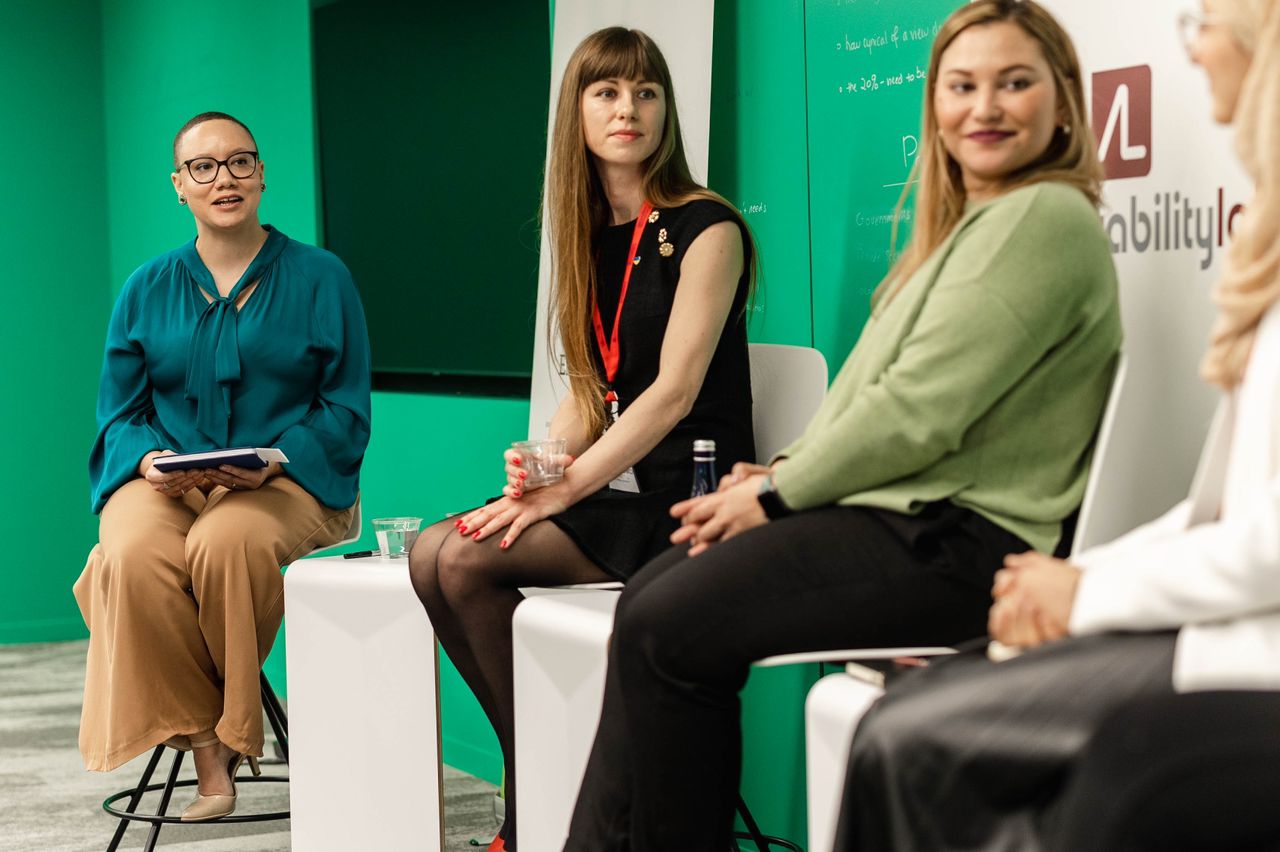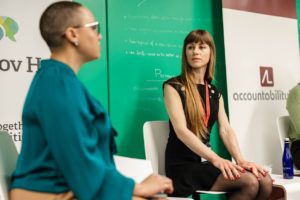NEWS

IN BRIEF
Written by Alawi Masud and Cheri-Leigh Erasmus Accountability Lab and […]
SHARE
Written by Alawi Masud and Cheri-Leigh Erasmus
Accountability Lab and the IRI Generation Democracy Program recently hosted a panel of 4 young change-makers to discuss youth leadership in times of democratic crises (watch the stream on Voice of America here). Mantate Queeneth Mlotshwa, Kateryna Dvornichenko, Khadija Amahal, and Lourdes Maria Argueta Vides discussed the current state of youth and civic space, the barriers that young people face, how to get youth involved, and the power of intergenerational collaboration. The young leaders shared extensively about their lived experiences pushing for positive change in their countries. Here are 5 lessons we learned from them.
- Young people are taking charge of their future
“It was the day when, after our students ran to protest, they were beaten. We woke up the next day, and thought, how did it come to this moment? Our young people were being beaten in the center of our capital by our own police who were being paid with our taxes. That moment was an epiphany for me. It made me understand I have to be involved in activism. I have to change my country. That was a crucial moment for many Ukrainians that we can’t just do our usual job, or studying, or something, we have to be part of action.”
– Kateryna Dvornichenko
Youth will play a substantial role in democratic processes to create the futures they want for their countries. Young people are frustrated by the status quo and are willing to fight for different, more inclusive systems. When they aren’t heard through the traditional participatory processes, they will put their energy towards avenues through which they feel heard, whether those options are democratic or not.
- Creative messaging can create trust
Khadija Amahal discussed how storytelling and education could further youth involvement in democratic processes.
 “When young people see the results of actions, they become more interested, more motivated, and more engaged. Due to this, there needs to be more space for young people to tell stories of how they’re engaged in democracy. We must allow young people to share stories about how they make a change, or create an initiative within a local or national context. Storytelling allows people to see the realities and the kind of challenges that we have, and how we react to these challenges in our communities.”
“When young people see the results of actions, they become more interested, more motivated, and more engaged. Due to this, there needs to be more space for young people to tell stories of how they’re engaged in democracy. We must allow young people to share stories about how they make a change, or create an initiative within a local or national context. Storytelling allows people to see the realities and the kind of challenges that we have, and how we react to these challenges in our communities.”
Education plays a key role as well. Khadija makes an apt point when she states that if we don’t understand our past, we won’t be convinced about the need to change our current realities. However, there is a lot of work to be done. Khadijah believes that investment in more creative ways to teach history and other social sciences can contribute to better understanding of governance and social issues.
“Presenting history in a fun new way could really encourage young people to understand how hard the previous generation has worked towards creating the peace that we have today. It would inspire them to continue to act and to really be motivated to create better circumstances for future generations.”
- Civic Education is key
“You have these MPs who promise to fix things they’re not responsible for, like potholes. Because citizens don’t know that, they can come in and promise those things. Once they get elected, you can’t ask them questions they say it’s not their responsibility, it is up to the local government.”
– Mantate Queeneth Mlotshwa
Mantate talked about how young people need to be educated on how their government works in order to spend their energy effectively. A lot of times, youth can be convinced to spend their energy on politicians who aren’t thinking about making actual change. Similarly, a lack of understanding of different government entities can lead to efforts to build accountability in the wrong places.
Lourdes, who also teaches history, shared that she’s seen an increase in students’ understanding of politics since she started teaching 8 years ago. At first, she observed low levels of understanding of basic political processes or governance structures, but this changed. “Flash forward to now and I’m seeing that my students are a lot more active, they know more about the basics…they’re more outspoken,” she says. 
- Inter-Generational Dialogue and Support is Important
Meaningful change requires working on challenges from a variety of angles, and including a diversity of perspectives.
“One of the things that I have always felt that was so useful as a young person- for the perspective, the experience, and the advice that I could get- is intergenerational dialogue. So anything from mentorships, to just talking or holding dialogues with my mentors, or people that I have worked with, who are older people who have more expertise in certain topics or subjects.”
– Lourdes Maria Argueta Vides
Lourdes states how, through intergenerational support, the older generation can help the younger generations step into advocacy and leadership spaces by sharing their experiences. More seasoned activists and CSO practitioners can use their access and influence to open doors and bring young people into the conversations where they are traditionally excluded. The ideas that come from intergenerational collaboration are limitless.
- The Packaging Matters
All of the speakers commented on the fact that governance conversations need to be made more accessible, relatable and engaging to attract young people. While the Summit for Democracy and other global initiatives may be front of mind for individuals working in civil society, information around government commitments to these processes are rarely packaged and distributed in ways that foster youth participation. Mantate uses the arts as a way to reach and activate young people in Zimbabwe, and similarly, Khadija has a deep belief in the importance of storytelling to make conversations that may feel distant more relatable. Instead of traditional formats and processes, CSOs need to prioritize meeting young constituents where they are, and doing so creatively. And when young people see the results of their actions, they become more interested, more motivated, and more engaged. It is a self-reinforcing circle.
This is not just a useful insight, but a call to action to open up conversations so that the zeal young people have for changing the trajectories of their communities and countries can be unlocked.
*Alawi Masud is the Operations Coordinator at Accountability Lab. Cheri-Leigh Erasmus is the Global Director of Learning at Accountability Lab.
For more, follow the Lab on Twitter.
